- Home
- Anson Cameron
The Last Pulse Page 3
The Last Pulse Read online
Page 3
‘I …’
‘Reg Auster promised me I wouldn’t be bothered by ignorant homosexuals while I worked. And look at this I’m hovered over and drooled on by the ignorantest type of gayboy before my labours have hardly begun.’ Gerald is astounded and raises his hands toward Merv, palms up to ward off his mistaken opinions. ‘I’m doing a degree in the Genetic Modification of Gossypium at the Bristol Agricultural College.’
‘So, not ignorant. But no denial on the sodomy,’ Merv observes. ‘And red-arsed queens staying at a safe distance was definitely a clause in my workplace conditions.’
‘I’m English,’ the kid explains. ‘My accent is English. I’m here on an exchange programme.’
‘You got exchanged with a Queenslander? They must rate you about as low as a drug-fucked gibbon back home, boy. That’s the usual rate of exchange for a Queenslander.’
Gerald just blinks a few times and walks back to his ute shaking his head with his mouth hanging open, rubbing his palms on his trouser legs. Merv calls to him. ‘See the truck out on the levee there, boy?’ Gerald stops, looks at the truck and then back at Merv. ‘I wouldn’t go near that truck if graduating from ag college is what you want for yourself. That truck, and the trailer over there, are about to explode.’
Beside The Party Animal Merv washes his arm in the water and chromed colours spread from it across the surface and Em imagines her father made of a thousand dried and powdered rainbows. Merv sets the wire spool by The Party Animal and climbs aboard holding the wire end in one hand, its two strands emerging from either end of his fist. ‘Now, my little precious Emma girl, we get to see the fireworks and hear a magic bang that will start our holiday flood. Get in the cabin under that bench. I’ll tell you when to come out and look. You don’t want to be blinded by miracles.’
Merv, like most terrorists, is a novice at explosives and detonations and has no real idea how this one will measure up. Like a suicide bomber his initiation is going to be his graduation. He thinks he’s done enough reading on ANFO to have a feel for it. But not enough to stop him having a recurring vision of intestines hanging from the silvery trees out in the water, swaying in the breeze.
He fetches a car battery from out of the bait locker and sits it on the bench seat and twists one strand of the wire around the positive terminal and holds the other above the negative terminal.
He’s suddenly breathless with a feeling of great freedom and godly size. As if he is about to be liberated from the now that separates his past from his future and imprisons him and keeps him from ever being in the before or after, no matter how much he yearns to be. Freed from the skerrick of drifting reality in which he lives, outside of which all is imagined or remembered, and escape from which has, until now, been impossible. An illusion that what he is about to do will set him free in time and make him large in spirit.
He revels in this high for a moment before touching the yellow wire to the negative terminal. The truck goes first. The trailer moments later. Both disappearing in silent brown blooms of sharp dirt and rolling smoke. Then a shock wave radiates across the water and rings The Party Animal like a bell. Two dull explosions waft past and shrapnel begins to hammer into her hull and Merv ducks down in the cabin and covers Em with his body as the boat heaves on the water and is played like a steel drum by the fusillade.
The truck’s gearbox and engine block skim across the water leaving steaming furrows in its surface at intervals until the engine block scythes through a dead tree and sinks boiling, its location marked by bubbles that burst smoking into the air. The gearbox continues to skim north across the water toward the tropics.
When the dirt has stopped falling from the sky Merv rises from the bottom of the boat. The air is dust and nothing of the damage can be seen. Invisibly, the portion of levee between the two blasts begins to move, begins to swing open like a door, all of a piece, before disintegrating and being romped over by a wall of water. The Party Animal starts pulling at her painter like a dog at a leash as the great body of water starts to flow south.
The distant kiss of two planets rolls dully across the citizens of Dillandbundy, stopping them in their tracks and making them look at the clear blue sky. Then they look to the west, to the breeze, and wait motionless for whatever else the sky might hold. Gradually they begin to move again, furrowed brows, wondering what the hell that was.
The Party Animal slides down the break in the levee, spinning and rocking on the surge of water as Em holds on, feeling a mix of unease and excitement. This should be fun. This sloshing boat ride into a forest on a flood with her father whooping at her to hang on. This start of a long river journey. Merv had told her he was going to blow up the levee and free the water to flow home to Livingstone Hedge where it belonged. He had told her the water was theirs and their neighbours’ and Bartel’s and these people who had built the dam had stolen it and caged it. He said locking the water in that dam was like locking an eagle in a suitcase.
So this shouldn’t feel wrong. But the explosions had been too big not to be bad. They told their own story. Explosions were not happy noises. These two were so loud and so much dirt flew so high and she could hear people shouting questions to each other through the dust and they sounded like they were scared and it made her doubt what her father had said. What was her dad to these people? What did he look like to them when they looked at him? A lion might be a good father, but he is a terror to the rest of the forest. Was Merv like that? A lion?
Merv is concentrating, moving The Party Animal across the rushing stream. A rip of white water trails in the wake of every tree trunk they pass now and the speed of the water means he has to make decisions a long way ahead. Em tries to look at him with the eyes of one of the people she’s heard calling from the dust. His nose is too big, she notices. And he has standy-up hair, and even though he is big himself, these two things make him look more like a funny man than a mean man. She feels again the waves of the two explosions going through her stomach, sees the patina of shock crossing the water toward her as she sneaks a look over the side, and feels the boat rock, her heart in her throat. And though the boat is now riding through trees and it should be fun, she begins to cry, knowing her father is a bad man. Not completely, but at least to some people. To the people in the dust. She knows Merv would not be doing this frightening thing if her mum hadn’t had a heart attack and gone on before them to get things ready.
Merv sees her crying, but is occupied at the wheel keeping this clumsy boat from hitting a tree and tipping and drowning them both.
‘We’re headed for home, Em,’ he calls to her. ‘Those people were thieves and robbers. Half-an-hour eating dust won’t hurt them. It’s all we’ve been eating for years.’
A flock of ringneck parrots put up by the rushing headwaters spark green through the trees, heading upstream. She watches Merv steering the boat clumsily, moving his whole body. She worries about him as a boat captain. Em knows those people couldn’t have all been thieves and robbers. Some of the people back there in the dust must have been good people. People are good. They bake cakes and build swimming pools. She saw a swimming pool back in Dillandbundy. And a cake shop. Deep down inside not even robbers mean to do what they do and they would rather do something good but are put to bad ways by bad things happening to them first. So, even if some of the people back there in the dust were bad they might have been bad because … their dads were bad. And lots were good, anyway. And if Merv had frightened and robbed good people, then – what did that mean about Merv?
Em dislikes this thought so much it makes her feel sick in the stomach. Her father grimacing, riding the brown water, the trees passing like power poles past their ute, it all blurs with tears and a new world forms from that blurred wreckage and in that new world they are back home in their town, Bartel. She is on the back of a truck with Merv, surrounded by a parade thought up by herself and Dr Seuss. The main street is a carnival. A brass band plays. The trombonist is an orang-utan in a top hat. He plays one-handed a
nd waves to Em with the other. Across the street is a banner that reads MERV. MERV. MERV. The parade passes beneath it; all sorts of animals and people, all walking on their hind legs, all wearing t-shirts with Merv’s smiling face on them and each one reads MERV. MERV. MERV. BARTEL’S HERO.
The band is playing a Creedence Clearwater Revival Song, a favourite of Merv’s called ‘Looking Out My Back Door’. And there are tambourines and elephants playing in the band. As one of the elephants toots his bassoon watermelon-sized bubbles emerge from its gaping mouth and on each is a smiling Merv. They drift into the sky and as they pop a gentle rain of droplets falls and where each hits the ground a chrysanthemum blooms in a moment.
Flights of swans pass overhead in formations that spell out the word MERV. Which seems terribly clever until a flock of ducks and swallows in full cooperation, the waterbirds providing major features, and the smaller creatures filling in with dimples and eyeballs, form a perfect, smiling portrait of her father, that stretches and warps in a crazy plasticity as it crosses high over the happy town.
The river is full and speedboats towing pyramids of water-skiers motor by, the skiers bend to scoop golden water up to their mouths, batting their eyelids and coming over all dreamy as if it were pistachio ice cream.
The Party Animal hits a tree and comes to a halt and begins to lean as water piles against its upstream side. Em falls out of her daydream to her knees. Merv swears and guns the motor and The Party Animal breaks free across stream just as waves start to step across the gunwale into the boat, wetting Em’s jeans.
‘Come here,’ he lifts Em and pulls her into the cabin. ‘The water will slow down soon. It’s keen to get out of Queensland.’ Navigating through the oncoming trees, he steals a glance at her. Her face is practising adult misery and loss. ‘They were Queenslanders,’ he explains.
‘That’s racist.’
‘No. It’s true.’
‘Some must be good,’ Em offers. ‘Some of everyone are.’ The Party Animal’s stern clips another red gum. He doesn’t know much about boats, either, Em thinks.
‘Those were the bastards who stole our farm.’
‘Why aren’t they hiding? They were dressed up and having a party.’
‘Well, that’s the saddest thing about it, Em. If one of them robbed another one of them they’d be put in jail. As far as that goes, neighbour-to-neighbour, they’re honest as we are. Wouldn’t think of robbing each other.’ He swings The Party Animal hard to starboard and guns the engine, stepping around a passing gum. ‘But these Queenslanders are like the old Spaniards who took everything from the Aztecs because, to them, the Aztecs weren’t people. Same as we aren’t people to Queenslanders. Just faraway Aztecs, and if our cities fall and our crops fail the Queenslanders will still be partying in tents.’
‘Where are the Aztecs now?’
‘They aren’t anywhere. They’re gone.’
‘How can they just be gone? Where did they go?’ She screws up her face with not knowing.
‘The Spaniards sent them to the grave. Then they lived in palaces made of the gold they stole from them.’
‘Why weren’t the police got onto the Spainyards?’
‘The Aztec police didn’t have guns and the Spanish police thought Aztecs were dumb as mules and should be robbed.’
‘Did the Spainyard ones speak the same as the Aztecs?’
‘Shit no. They speak Spanish. The Aztecs spoke – some crazy Indian talk made of grunts and howls.’
‘Were those Aztecs real ones? Or are you making them up?’
‘You know what, sometime in the future some little Queensland girl will be asking her father if the South Australians were real or not.’
‘Why?’
‘Because we’ll be gone and little girls don’t believe what their fathers tell them.’
Em went to the stern and sat and watched the motor cut a furrow in the brown water. She found it hard to believe the people back at the tents thought of her as an Aztec. She’d heard them shout out in English. Shout things she would have shouted herself if her party had blown up. What if Merv is lying? What if all this is a lie? She looks at him, at his back, wondering.
On a stage at the top of the street where the parade is heading is the Mayor of Bartel in a robe and shiny boots, happy helper monkeys cavort at his feet and pat his ankles to reassure him, and next to him an Aztec King in woven grass clothing and magnificent gold jewellery and a crown of gold studded with rubies. This King holds two medals made of brightest gold. Two medals? Could one be for her? (Em knows it is. The King is her invention.)
A drizzle of quacks and tweets drifts down from the sky and high overhead is the duck and swallow portrait of Merv waving and billowing like a great canvas in a breeze. Slowly its features run and lose focus and it becomes just a face, an unknowable person, until the ducks and the swallows, tweeting and quacking, orchestrate their squadron once again and the face begins to sharpen, to focus into an identity, a girl, an astonishingly pretty girl. It is Em. Her face large as a football oval and happy. Her eyes sparkling as brightly as the jagged flight of swallows can paint them.
A thousand feet beneath this shimmering portrait a clumsy, but good-hearted, flight of swans crosses the sky spelling EM.
Her father, watching her eyes lose focus and the hostility drift from her face and meld to happiness, knows she has gone to a girlish place where whisky drips from the rocks, as it were. Good, he thinks. Good. It’s not time yet to understand Aztecs and Spaniards and Queenslanders and lost and ruined worlds. Better she stays in whatever storybook will hold her for as long as possible.
He looks at the clouds reflected in the floodtide of his freed water. A father has no way of answering truly all his daughter’s questions.
‘Merv?’
‘Yes, Em.’
‘Did you steal this water? Or did you take it back?’
‘I took it back, Em. All this water we’re riding on has flowed where it’s flowing now since before time began. It’s going home.’
‘Like us?’
‘Like us, Em. Going home. Unless you reckon five greedy men with warts on their noses should be able to kill half-a-world to make themselves rich.’
‘No.’ She shakes her head. Then smiles. ‘Five greedy Spainyards with warts,’ she corrects him. But worry comes to her face again. ‘What will happen, Merv?’
‘It will flood the billabongs and the trees will drink and …’ He sees her shaking her head.
‘When we get home, you mean?’
She nods.
‘We’ll be heroes and the people will cheer and clap,’ he tells her. ‘Because we’ll have given them their water back. And when they get their water back they can grow oranges and grapes and apricots and rice and all the things they used to grow. And then they will have food and money and Bartel will be a happy place again.’
It didn’t seem true. He exploded people at a party. And now he’s saying these happy things fast and not looking at her. ‘Do you promise, Merv?’ Her face is grave.
He flicks the motor into neutral and kneels before her in the bottom of the boat and takes the point of her chin and looks into her eyes. ‘I promise, honey. People will be on both sides of the river cheering and there will be signs to welcome us and boats honking horns and we’ll be like we’ve won Olympic medals.’
‘Okay, then. I like that. But it would be better if we didn’t blow people up next time.’
‘Okay. Okay. No blowing people up next time.’ He takes her into his arms and holds her.
In the evening, Merv begins to drink from a bottle of whisky as he pilots the boat downstream. Em sits on the chair next to him, eating bread and Vegemite and watching the river unwind and the trees pass. Merv is drawn to think about his lost world as the level in the bottle lowers.
‘Where is David Birrell now?’ he asks. ‘A good farmer. Good father. Three kids.’ He takes his hand off the wheel and holds it out to Em with splayed fingers, bidding her answer. She knows the routine
.
‘His vines died. He gassed himself from money trouble,’ she answers.
Merv nods. ‘And on his grave only “Dearly Beloved” and the date of his birth and the date of his death and “Rest In Peace” and nothing about how or why. Nothing about Queensland upstream.’ The boat’s engines grumble and the water folds and breaks white on the tree trunks. Black cockatoos arriving in from the plain call up and down the river to place themselves.
‘And where is Paolo Del Negro?’ He holds both palms to the air, waiting Em’s response.
She stops chewing her bread and answers, ‘His orchard is dead sticks and he is in jail for having an inviction siege with the police.’
‘True,’ Merv drinks, tears coming to his eyes. ‘Evicting an Italian … you expect shots fired. And where is Maria, his beautiful wife?’
‘A warfare recipe in Melbourne,’ Em says sadly.
‘Exactly,’ Merv nods. ‘Good girl. A welfare recipient, visiting a prison every week.’
‘And where is Old Shane O’Connell?’ Em takes the lead. ‘Who used to let me ride on his horses.’
‘A drunk in a pub in Adelaide,’ Merv answers sadly. ‘Turned his horses into beer and turned himself into a drunk with that beer.’
‘How did he turn his horses into beer?’ Em has broken from the script, truly puzzled.
‘He sold them and bought beer with the money.’
‘Ohh.’ Em frowns and takes a bite of her bread. ‘That’s not really turning horses into beer. Someone else has the horses.’
‘But he really turned into a drunk,’ Merv nods and drinks.
‘Okay. And where is Deano Cargill who had forgotten more about citrus than most people ever knew?’ Em asks.
‘Gone,’ Merv is crying now at the thought of Lucy Cargill abandoned. ‘Walked off. Bolted. And the young Cargills wandering the streets like abos.’
‘Yes. And yelling rude things.’
‘They might as well have bombed us,’ Merv whispers.

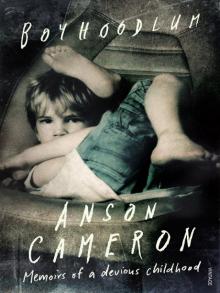 Boyhoodlum
Boyhoodlum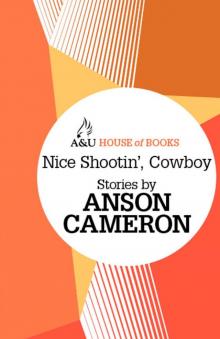 Nice Shootin' Cowboy
Nice Shootin' Cowboy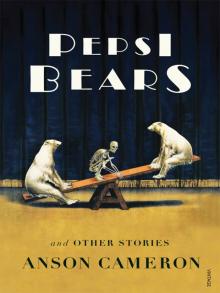 Pepsi Bears and Other Stories
Pepsi Bears and Other Stories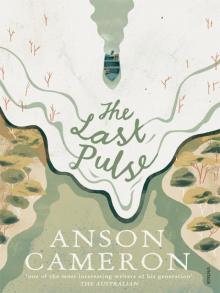 The Last Pulse
The Last Pulse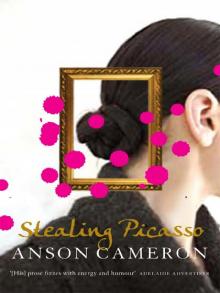 Stealing Picasso
Stealing Picasso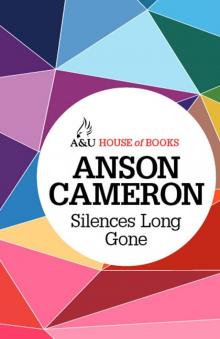 Silences Long Gone
Silences Long Gone